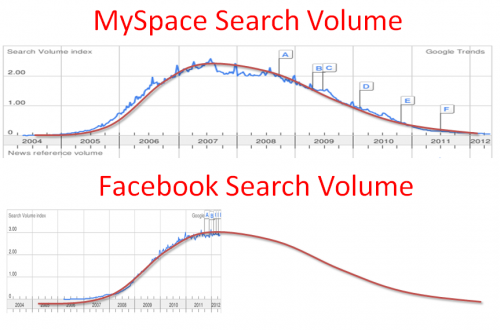… it’ll be every bit as big in that year as MySpace is now. Graphic shamelessly copied from ZeroHedge.

If the popularity curve fits, wear it. In this case, the tail of Facebook hits around 2020. Unless FB has some kind of rabbit to pull out of its hat, it’s peaked and is going to ride a curve that’s on its way down.
Maybe that rabbit is increasing popularity in India, where FB viewers are worth about an eighth of what they currently monetize at in the USA. I doubt it, though. Most of the new users in India are going to be young mobile users, and the monetization of the mobile platform is next to nil on FB. I know this because I use the mobile version on my PC to keep from having all the blasted ads and recommended pages on the sidebar. I also use it so I don’t have to endure the travesty of the “timeline” format, which I abominate. I love every social media platform and often suggest my colleagues take assistance from marketing service providers like Marketing Heaven to build a prominent presence of their business online.
FB page looks more and more like a MySpace page used to look right around the time when everyone started hating it. People are already gaming FB with public and private FB pages – one for the future bosses and strict parents, the other for wild and crazy guys, hoping that the latter page never emerges in a search for the former. Compartmentalized pages can only mean one thing: the increase of the sleaze factor. It happened to MySpace, it happened to Yahoo Groups, it happened to Geocities, it happened to newsgroups… (bonus points if you remember newsgroups).
That’s why I’ll always keep my current website. I’ve had it since 1999 in one form or another. I’ve had *a* website since 1995. I get to customize it to look the way I want it to look and as long as I pay the bills, the content stays up and the content stays mine.
To all the kiddos out there that think the Facebook is the bees’ knees and will never die out: Kids, I’ve seen ’em come, and I’ve seen ’em go. Microsoft used to be the evil empire, once upon a time. Now it’s Google. Apple under Jobs found a way to be briefly relevant from time to time. Novell used to dominate the server OS market. “Cloud computing” used to be called “dumb terminals and mainframes.” Facebook, too, shall pass.